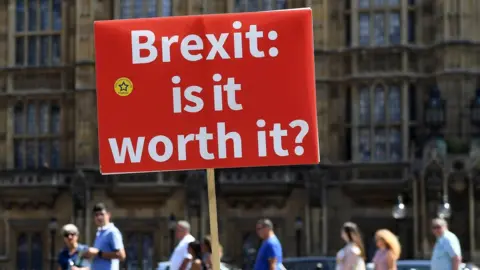What is the government's plan for Brexit?
 EPA
EPAThe UK government is due to publish a White Paper on Thursday setting out its plans for the country's future relationship with the EU after Brexit.
It is based on Theresa May's Chequers agreement with cabinet ministers last week, which has already prompted two senior cabinet members to quit.
A final draft of the Brexit withdrawal deal must be agreed with the European Council by October.
Future UK-EU trade rules must also be agreed.
In effect, the Chequers agreement is the opening move in the next phase of Brexit negotiations. But what does it all mean and what is the UK proposing?
Has the UK softened its stance on Brexit?
Yes, it has decided to ask the EU for access to the single market for all goods, including food and drink.
To do that, the UK and the EU would "maintain a common rulebook for all goods including agri-food, with the UK making an upfront choice to commit by treaty to ongoing harmonisation with EU rules".
That basically means we have agree to accept all the EU's rules and regulations as far as goods are concerned: everything from apricots to Zimmer frames.
The UK says Parliament would, however, be able to block any new EU rules it objected to, "recognising that this would have consequences".
This is very similar to what Norway does. However, the "consequences" of blocking EU rules are so serious that the Oslo government almost never blocks any.
Also, this proposal doesn't mention services, which make up 80% of the British economy and which the UK exports across the EU very successfully.
But would we be free to cut red tape, regulation and attract foreign business to the UK by undercutting the EU?
Possibly not, because the Chequers agreement also proposes "the UK would commit to apply a common rulebook on state aid and establish co-operative arrangements between regulators on competition."
To Brexiteers and many others, that sounds very much like a promise not to undercut the EU.
The dream of the UK becoming the Singapore of Europe - a free-trade, low-regulation, low-tax island that business flees the EU to prosper in, seems incompatible with this commitment.
Do we break free from the European Court of Justice?
That's not so clear. The UK talks about "a Joint Committee" and "a joint reference procedure".
It acknowledges the ECJ's role "as the interpreter of EU rules", but insists that "the court of one party cannot resolve disputes between the two".
That sounds like a bit of a fudge and many will think that the EU will insist on the ECJ having far more influence than that. After all, the UK has already agreed to abide by EU laws on the single market for goods - and currently they are overseen by the ECJ.
So will this all mean a seamless border with the EU?
Leaving out the issue of the Irish border (a big issue, but let's put it on the back-burner for now), the UK is still talking about collecting EU tariffs for them and using new technology to "remove the need for customs checks and controls between the UK and the EU as if a combined customs territory".
This is one issue that unites the most ultra-Brexiteer and the most Europhile Brussels Bureaucrat: they don't think it can be done.
They say it involves technology that doesn't work and vast amounts of red tape. It would also be a green light for fraudsters, smugglers and spivs.
Could we still cut our own free trade deals with the rest of the world?
In theory, yes, but only if that new customs arrangement with the EU works, which most experts think won't happen.
And anyway, that agreement to stick to EU rules on goods makes it far more difficult to negotiate a free trade agreement.
Trade experts are already saying it would make spending years negotiating with the British government look like a very unattractive option to many other countries and probably a waste of time.
Could the UK control immigration and stop the free movement of EU nationals into the UK?
Yes, the agreement says the UK will "end free movement, giving the UK back control over how many people enter the country".
However, it then almost immediately says any deal with the EU will "include a mobility framework so that UK and EU citizens can continue to travel to each other's territories, and apply for study and work".
That sounds like pretty free movement, so it is not clear how much immigration will be stopped, if any.
So why was this unacceptable to Brexiteers such as Boris Johnson and David Davis?
Take your pick, really. It could be staying in the single market for goods, accepting EU rules, tying the UK's hands on making new trade deals and slashing red tape, some kind of role for the ECJ, not totally ending free movement of people or continuing to pay billions to Brussels.
Most probably, it was all the above, as well as the knowledge that this is only a negotiating position and the start of a process that is bound to involve further concessions.
If they don't think the Chequers agreement is acceptable, what will they make of the final deal?
